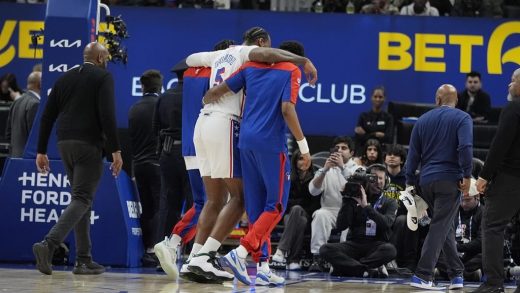:format(webp)/https://www.thestar.com/content/dam/thestar/entertainment/stage/2022/10/28/are-toronto-theatregoers-having-too-much-fun-these-broadway-productions-show-theatre-can-challenge-provoke-and-even-offend/strange_loop.jpg)
NEW YORK CITY Toronto theatregoers are having too much fun. And that’s not necessarily a good thing.
Sure, call me a curmudgeon, but that “fun” seems to be the adjective of choice among audiences strutting out of the theatre these days is telling of the art that’s being produced on our stages.
I’ll be the first to admit it: I love some vapid live entertainment from time to time. An easy-to-consume jukebox musical or a blockbuster screen-to-stage adaptation is sometimes just what I need. But it seems, lately, anything remotely stimulating has been happening at the city’s smaller publicly funded venues.
Theatre is a place for escapism, yes, but also where participants should expect to be challenged, provoked and even offended. A recent trip to New York City earlier this month, where I caught five thrilling Broadway productions, reminded me that those types of productions do belong on the largest, and sometimes most commercial, of stages.
Anyone concerned Broadway is sacrificing artistic integrity in favour of adaptations of known commercial material that will draw back audiences following an industry-crippling pandemic need not worry. While there will always be your flying green witches, anthropomorphic sub-Saharan animals and slew of jukebox musicals up on the marquees of the Great White Way, behind the glittering neon lights is a robust lineup of lesser-known productions that, with their daring visions (some more successful than others), are showing us an ecosystem of diverse shows can exist.
Perhaps the most daring of the five shows I attended was “A Strange Loop.” Utterly deserving of the 2022 Tony Award for Best Musical, Michael R. Jackson’s musical is so brutally honest that, in certain moments, it’s almost too painful to watch.
The central conflict in “A Strange Loop,” which Jackson describes as “emotionally autobiographical,” concerns Usher, a fat, Black, gay musical theatre writer who is stuck in a self-referential loop of self-loathing and tormented by the six badgering thoughts in his head as he writes a musical about a fat, Black, gay man writing a musical about a fat, Black, gay man … and so on.
The 100-minute production, fiercely directed by Stephen Brackett on Arnulfo Maldonado’s metaphysical set populated with six neon door frames, packs an emotional punch as it confronts, without restraint, the tropes of Black art and the genre itself.
As Usher, Edwin Bates (covering for Jaquel Spivey) is a portal to a tormented soul, delivering a performance with a pathos that bracingly grabs and holds you for the entirely of the production. The ensemble — James Jackson Jr., John-Michael Lyles, Jason Veasey, Jon-Michael Reese and Tony nominees L Morgan Lee and John-Andrew Morrison — are equally brilliant as Usher’s various thoughts.
It takes courage not to just write a daring, original musicals these days, but to also produce these works in a cutthroat ecosystem in which most new works fail to recoup their initial investment. Though “A Strange Loop” has picked up almost every theatre honour — Jackson is the first Black musical theatre writer to win the Pulitzer Prize for Drama — the jury is still out whether the show will be a commercial success, with the production slated to close in January.
Here’s hoping the musical finds its way up north in the near future because Toronto audiences deserve to see this vital piece of theatre. (Of note, its Broadway producers include Yonge Street Theatricals, the Canadian investors also behind “Come From Away.”)
When Jackson earned the Pulitzer in 2020 for “A Strange Loop,” it had been 30 years since the last Black man garnered the prize. In 1990, the honour went to revered American playwright August Wilson for “The Piano Lesson,” his family drama set in 1930s Pittsburgh in the aftermath of the Great Depression. Three decades after it premiered on Broadway, the play is receiving a fine revival at the Ethel Barrymore Theatre, with a mighty crop of A-list actors directed by LaTanya Richardson Jackson.
One of 10 plays in Wilson’s Century Cycle, a collection of works documenting the African-American experience in 20th-century American society, “The Piano Lesson” follows members of the Charles family as they battle over the future of a treasured family heirloom: an upright piano carved with the portraits of the Black family’s enslaved ancestors. For Boy Willie (John David Washington, delivering a barn-burning performance filled with fiery passion), the piano offers liberation through its monetary value; he wants to sell it and acquire a plot of farm land upon which his ancestors formerly toiled as slaves. However, for his sister Berniece (a grounded Shirine Babb, covering for Danielle Brooks, out sick with COVID-19), the piano must be kept in the family’s possession as a sentimental emblem of their ancestors’ bloodstained struggle.
Meanwhile, the household, headed by Doaker Charles (played by Richardson Jackson’s husband, Samuel L. Jackson) is haunted by the ghost of Sutter, who enslaved Berniece’s and Boy Willie’s ancestors. The ghoul is a powerful symbol for how America’s history of slavery continues to hang over the country — just as Berniece and Boy Willie are symbolic of the various paths of reckoning, honouring and remembering America’s brutal past.
Periodically, Jackson’s production leans into the play’s horror themes too literally, with Japhy Weideman’s excessive lighting design making the Charles household appear like a tacky haunted house.
But overall, this revival remains a robust showcase for its stars and it’s always thrilling to be in an audience filled with so many fans. Perhaps it can be chalked up to the fact I saw this production during opening week — or that Toronto audiences are generally polite to the point of being restrained — but hearing ovations at every entrance and whoops after key monologues was electrifying.
A few blocks over at the Hudson Theatre, Wendell Pierce was also greeted by a hefty ovation upon his striking entrance. He struts through the door with two briefcases in hand that land with a resounding thump as he lets them fall to the floor, followed instantaneously by a striking burst of light. Thus begins the revelatory revival of Arthur Miller’s “Death of a Salesman.”
Pierce, known for his work on “The Wire,” stars as Willy Loman, the debilitated travelling salesman crushed as his unreachable American Dream languishes in decay. He stammers about as shards of distant memories flash before him. Opposite Pierce’s Willy Loman is Sharon D. Clarke as Linda Loman, who unflinchingly protects her husband from his self-destructive tendencies. Clarke, who recently starred in Broadway’s “Caroline, or Change,” is astounding in the role; her delivery of the play’s most famous line — “Attention must be paid!” — is shatteringly devastating.
The significance of this production, however, lies not in the cast, wonderful as they may be, but in director Miranda Cromwell’s vision through this casting. There have been six productions of “Death of a Salesman” on Broadway. This is the first to feature a Black Loman family.
This new interpretation, which places a Black family at the centre of one of America’s greatest stage dramas, threads themes of racism into Miller’s original text. A scene in which Willy requests a new position in his hometown of New York so he no longer has travel, but is coldly denied by his boss (Blake DeLong), is now all the more crushing as unspoken racism bubbles to the fore.
Non-traditional casting has become all the more common in recent years, as contemporary directors revisit classic works with fresh perspectives. But the practice hasn’t always been so widely accepted. Wilson himself admonished the prospect of a “Death of a Salesman” with a Black Loman family: “To mount an all-Black production of a ‘Death of a Salesman’ or any other play conceived for white actors as an investigation of the human condition through the specifics of white culture is to deny us our own humanity, our own history and the need to make our own investigations from the cultural ground on which we stand as Black Americans,” Wilson said in 1996.
More than a quarter of a century later, I’m curious if Wilson would change his stance after viewing this production, which feels as necessary and vital as air.
Equally bold in its vision, but far less successful in its execution, is the Roundabout Theatre’s production of “1776,” playing at the American Airlines Theatre before heading out on a national tour. As in “Death of a Salesman,” non-traditional casting plays a significant role in this reimagination of the 1969 Tony Award-winning best musical.
Women, transgender and non-binary actors, many of whom are people of colour, assume the roles of America’s Founding Fathers in this production, directed by Diane Paulus and Jeffrey L. Page.
It’s a powerful conceit: having those who were left out of the picture and denied a voice when the Declaration of Independence was signed play those deeply flawed white men, many of whom perpetuated those systems of exclusion. Behind the witty dialogue and tuneful numbers, Sherman Edwards’ and Peter Stone’s musical is a sharp indictment of American exceptionalism, pointing out the hypocrisy and blind spots embedded in the country’s bloodstained myth of creation.
This production’s casting could do so much to underscore those themes. But Paulus’s and Page’s production feels hastily put together, only scratching the surface of what this bold casting can reveal. While the musical begins and ends with an ingenious meta-theatrical framing device — the actors enter in modern dress and literally step into the shoes of the Founding Fathers — much of the proceeding in between is bereft of a strong directorial vision.
Too often, Paulus and Page have the actors turn to the audience and break the fourth wall, as if acknowledging, repeatedly, the obvious irony that these are not white men playing the Founding Fathers. The production design is also greatly lacking. The two sliding curtains (set design by Scott Pask) upon which various images and words are projected feel like they belong in a shower, not on a Broadway stage. Paired with some rather static staging, the entire production feels cheap and at the level you’d expect from a polished student group.
Of the four revivals — two musical and two plays — I attended, none were as sublime as Stephen Sondheim’s “Into the Woods,” playing at the St. James Theatre for a limited run ending in January. To quote one of the guiding principles of the late, great American composer and lyricist, “less is more.” Director Lear deBessonet’s scintillating production fully embraces that tenet.
DeBessonet strips the musical down so that Sondheim’s music and James Lapine’s storytelling shine through. Never have I heard Sondheim’s lyrics and music so crisply interpreted. With Scott Lehrer’s and Alex Neumann’s sound design, not a single word nor note is lost.
It’s been two decades since “Into the Woods” landed on Broadway. It feels particularly appropriate that the musical — arguably Sondheim’s most popular among audiences — is back to work its magic on the Great White Way right now.
When the musical first premiered in the 1980s, it was seen by some as an allegory for the AIDS crisis. Its first Broadway revival came just months after the Sept. 11 attacks. And now, this second revival is among the first few productions to welcome audiences back following the COVID-19 pandemic.
The musical, which interweaves various fairy tales by the Brothers Grimm into a complex story about wishes and consequences, at times highly moralistic, never fails to be the perfect antidote after a trying time.
This cast is uniformly superb, each revealing new layers to their complex characters. Particular standouts, however, are Stephanie J. Block as the Baker’s Wife and Krysta Rodriguez as Cinderella.
For me, the most moving moment comes late in the second act. Sondheim and Lapine have been criticized on occasion for how they wrap up this intricate story. Some, myself included, feel they fall too easily into cliched truisms to conclude the narrative, with songs like “No One Is Alone” and “Children Will Listen” capping the second act.
Not so this time. I’m not sure if it’s this strange time we’re in or the way those two songs are delivered — the cast stands near the lip of the stage, singing not just to the other characters but also directly to us — but after this time of immense loss for so many, Sondheim’s lyrics are the words we need to hear.
JOIN THE CONVERSATION

:format(webp)/https://www.thestar.com/content/dam/thestar/entertainment/stage/2022/10/28/are-toronto-theatregoers-having-too-much-fun-these-broadway-productions-show-theatre-can-challenge-provoke-and-even-offend/piano_lesson_2.jpg)
:format(webp)/https://www.thestar.com/content/dam/thestar/entertainment/stage/2022/10/28/are-toronto-theatregoers-having-too-much-fun-these-broadway-productions-show-theatre-can-challenge-provoke-and-even-offend/salesman_2.jpg)
:format(webp)/https://www.thestar.com/content/dam/thestar/entertainment/stage/2022/10/28/are-toronto-theatregoers-having-too-much-fun-these-broadway-productions-show-theatre-can-challenge-provoke-and-even-offend/_1776.jpg)
:format(webp)/https://www.thestar.com/content/dam/thestar/entertainment/stage/2022/10/28/are-toronto-theatregoers-having-too-much-fun-these-broadway-productions-show-theatre-can-challenge-provoke-and-even-offend/into_the_woods_2.jpg)



